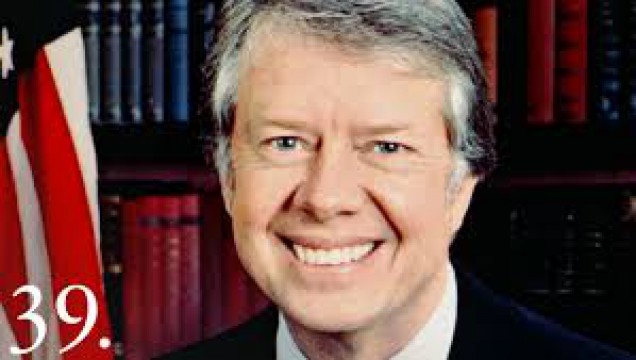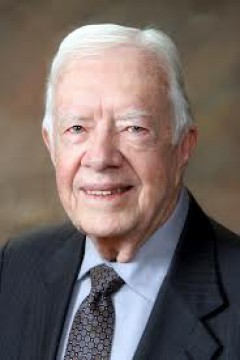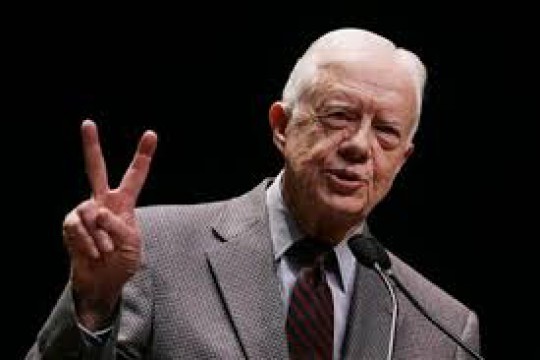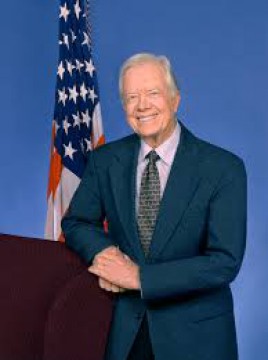PERSON: Jimmy Carter
Employer
The Carter Center
Position
Founder, Former President of the United States
Biography
Jimmy Carter (James Earl Carter, Jr.), 39th president of the United States, was born Oct. 1, 1924, in the small farming town of Plains, Ga., and grew up in the nearby community of Archery. His father, James Earl Carter Sr., was a farmer and businessman; his mother, Lillian Gordy Carter, a registered nurse.
He was educated in the public school of Plains, attended Georgia Southwestern College and the Georgia Institute of Technology, and received a Bachelor of Science degree from the United States Naval Academy in 1946. In the Navy he became a submariner, serving in both the Atlantic and Pacific fleets and rising to the rank of lieutenant. Chosen by Admiral Hyman Rickover for the nuclear submarine program, he was assigned to Schenectady, N.Y., where he took graduate work at Union College in reactor technology and nuclear physics, and served as senior officer of the pre-commissioning crew of the Seawolf, the second nuclear submarine.
On July 7, 1946, he married Rosalynn Smith of Plains. When his father died in 1953, he resigned his naval commission and returned with his family to Georgia. He took over the Carter farms, and he and Rosalynn operated Carter’s Warehouse, a general-purpose seed and farm supply company in Plains. He quickly became a leader of the community, serving on county boards supervising education, the hospital authority, and the library. In 1962 he won election to the Georgia Senate. He lost his first gubernatorial campaign in 1966, but won the next election, becoming Georgia’s 76th governor on Jan. 12, 1971. He was the Democratic National Committee campaign chairman for the 1974 congressional and gubernatorial elections.
On Dec. 12, 1974, he announced his candidacy for president of the United States. He won his party’s nomination on the first ballot at the 1976 Democratic National Convention and was elected president on Nov. 2, 1976.
Jimmy Carter served as president from Jan. 20, 1977 to Jan. 20, 1981. Significant foreign policy accomplishments of his administration included the Panama Canal treaties, the Camp David Accords, the treaty of peace between Egypt and Israel, the SALT II treaty with the Soviet Union, and the establishment of U.S. diplomatic relations with the People’s Republic of China. He championed human rights throughout the world. On the domestic side, the administration’s achievements included a comprehensive energy program conducted by a new Department of Energy; deregulation in energy, transportation, communications, and finance; major educational programs under a new Department of Education; and major environmental protection legislation, including the Alaska National Interest Lands Conservation Act.
In 1982, he became University Distinguished Professor at Emory University in Atlanta, Ga., and founded The Carter Center. Actively guided by President Carter, the nonpartisan and nonprofit Center addresses national and international issues of public policy. Carter Center staff and associates join with President Carter in efforts to resolve conflict, promote democracy, protect human rights, and prevent disease and other afflictions. The Center has spearheaded the international effort to eradicate Guinea worm disease, which is poised to be the second human disease in history to be eradicated.
Jimmy and Rosalynn Carter volunteer one week a year for Habitat for Humanity, a nonprofit organization that helps needy people in the United States and in other countries renovate and build homes for themselves. Since 2007, President Carter also has served as a member of The Elders, a group of independent global leaders. He teaches Sunday school and is a deacon in the Maranatha Baptist Church of Plains. For recreation, he enjoys fly-fishing, woodworking, and swimming. The Carters have three sons, one daughter, nine grandsons, three granddaughters, four great-grandsons and five great-granddaughters.
On Dec. 10, 2002, the Norwegian Nobel Committee awarded the Nobel Peace Prize for 2002 to Mr. Carter “for his decades of untiring effort to find peaceful solutions to international conflicts, to advance democracy and human rights, and to promote economic and social development.”
— cartercenter.org
He was educated in the public school of Plains, attended Georgia Southwestern College and the Georgia Institute of Technology, and received a Bachelor of Science degree from the United States Naval Academy in 1946. In the Navy he became a submariner, serving in both the Atlantic and Pacific fleets and rising to the rank of lieutenant. Chosen by Admiral Hyman Rickover for the nuclear submarine program, he was assigned to Schenectady, N.Y., where he took graduate work at Union College in reactor technology and nuclear physics, and served as senior officer of the pre-commissioning crew of the Seawolf, the second nuclear submarine.
On July 7, 1946, he married Rosalynn Smith of Plains. When his father died in 1953, he resigned his naval commission and returned with his family to Georgia. He took over the Carter farms, and he and Rosalynn operated Carter’s Warehouse, a general-purpose seed and farm supply company in Plains. He quickly became a leader of the community, serving on county boards supervising education, the hospital authority, and the library. In 1962 he won election to the Georgia Senate. He lost his first gubernatorial campaign in 1966, but won the next election, becoming Georgia’s 76th governor on Jan. 12, 1971. He was the Democratic National Committee campaign chairman for the 1974 congressional and gubernatorial elections.
On Dec. 12, 1974, he announced his candidacy for president of the United States. He won his party’s nomination on the first ballot at the 1976 Democratic National Convention and was elected president on Nov. 2, 1976.
Jimmy Carter served as president from Jan. 20, 1977 to Jan. 20, 1981. Significant foreign policy accomplishments of his administration included the Panama Canal treaties, the Camp David Accords, the treaty of peace between Egypt and Israel, the SALT II treaty with the Soviet Union, and the establishment of U.S. diplomatic relations with the People’s Republic of China. He championed human rights throughout the world. On the domestic side, the administration’s achievements included a comprehensive energy program conducted by a new Department of Energy; deregulation in energy, transportation, communications, and finance; major educational programs under a new Department of Education; and major environmental protection legislation, including the Alaska National Interest Lands Conservation Act.
In 1982, he became University Distinguished Professor at Emory University in Atlanta, Ga., and founded The Carter Center. Actively guided by President Carter, the nonpartisan and nonprofit Center addresses national and international issues of public policy. Carter Center staff and associates join with President Carter in efforts to resolve conflict, promote democracy, protect human rights, and prevent disease and other afflictions. The Center has spearheaded the international effort to eradicate Guinea worm disease, which is poised to be the second human disease in history to be eradicated.
Jimmy and Rosalynn Carter volunteer one week a year for Habitat for Humanity, a nonprofit organization that helps needy people in the United States and in other countries renovate and build homes for themselves. Since 2007, President Carter also has served as a member of The Elders, a group of independent global leaders. He teaches Sunday school and is a deacon in the Maranatha Baptist Church of Plains. For recreation, he enjoys fly-fishing, woodworking, and swimming. The Carters have three sons, one daughter, nine grandsons, three granddaughters, four great-grandsons and five great-granddaughters.
On Dec. 10, 2002, the Norwegian Nobel Committee awarded the Nobel Peace Prize for 2002 to Mr. Carter “for his decades of untiring effort to find peaceful solutions to international conflicts, to advance democracy and human rights, and to promote economic and social development.”
— cartercenter.org
ClipsBank
Full
Compact
NewsBase
Full
Compact
RadioBank
Full
Compact
PodBank
Full
Compact
TranscriptBank
Full
Compact
No data found









